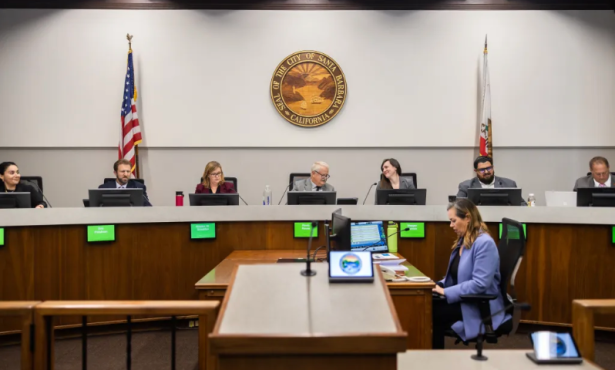Bad Dream or Ponzi Scheme?
Montecito Man Accused of Massive Fraud; Blames Losses on Sour Economy

By most accounts, David Prenatt is a great guy. Outgoing and charismatic, he’s regarded by many as an exceptionally kind person. He and his wife have been involved with CASA and the Mental Health Association (MHA), and the two sit on the MHA board with David as the board chair. “They’re really, really genuinely nice people,” said one of the couple’s friends.
But several people — former friends and business partners — who might agree about Prenatt’s charisma and charm, have a different take on how nice of a guy he really is. They claim he has defrauded them out of millions of dollars, ruined their lives, and forced the closure of properties that include the State Street Hotel. A number have since filed lawsuits against Prenatt, a resident of Montecito for nearly 17 years.
Prenatt himself is currently in bankruptcy court, but several of these upset individuals, corporations, and banks have filed complaints asking the court to deny his petition for bankruptcy.
The most noteworthy of his critics are the Bronfmans, Edgar Sr. and his son Adam. The heir of the Seagram Company alcohol distillery, Edgar Bronfman is considered one of the wealthiest people in the country, and his family helped build the Bronfman Family Jewish Community Center here in Santa Barbara.
Together, according to court documents, the two lent Prenatt a total of $2.5 million and drafted promissory notes requiring that Prenatt pay them back the principal amount plus 10 percent interest. As part of the deal, Prenatt signed a personal financial statement for the two in which he represented his net worth to be $19.6 million.
This statement, the father and son allege, is materially false. “It both overvalues his assets and also fails to list substantial unsecured debt that he owed at the time of the financial statement,” they claim in documents, further stating he exaggerated his wealth with the intent to deceive them.
Since then, according to the suit, Prenatt has defaulted on the payment required by the three promissory notes, and owes the principal plus the interest rate amount to both Bronfmans.
Economic Tsunami
This story is one several people are telling after having lost money they invested with Prenatt. “We’re all about in the same boat,” said Tom Konig. A former close friend of the Prenatts, Konig originally brought the Bronfmans in to do business and says he lost his own money during a failed investment deal with Prenatt. Konig had filed suit against him, but dropped it.
Prenatt, meanwhile, has taken the accusations very personally, and said it was an “economic tsunami” that led to the money losses. “Without question, I can tell you I got hit in the absolute perfect tsunami which locked my sources of income,” he said. Added a friend of Prenatt’s: “Whenever people lose money, they’re going to look for a person to blame.”
Nevertheless, Prenatt’s onetime business partner, Atul Patel, is in a boat with a large hole. Patel and Prenatt invested in properties throughout the county that, according to documents, include the El Prado Inn, the State Street Hotel, and multiple Holiday Inns. Prenatt would raise money for the business ventures, and Patel would run them once they were in place. Patel, now on the hook with several creditors, is alleging he’s out at least $8.2 million after his investments fell through.
Prenatt and Patel were managers of Central Coast Hotel Properties, LLC (CCHP), a group that had a hand in several other limited liability corporations and partnerships that invested in various properties. In one instance, CCHP was the sole manager of P&P Santa Barbara Hospitality Investments, LP, and the group was seeking to buy the El Prado. Prenatt, acting as manager of CCHP, arranged for $13.6 million in financing for the purchase of the hotel at 1601 State Street.
Lawyers for P&P, the plaintiff in one suit, say the company paid Prenatt a commission fee of $156,000 while also investing $3.37 million in capital toward the purchase in addition to the financing, but only after placing its trust and faith in Prenatt’s financial reportage.
A Matter of Debts
The financing, however, allegedly came as a result of monetary representations to lenders that “materially understated” Prenatt’s liabilities by $10 million and overstated the value of his personal assets. In May 2008, Prenatt told CoastHills Federal Credit Union he had a net worth of $17.9 million. In February 2009 — eight months prior to being forced into bankruptcy — he said he had a net worth of $21.7 million. But not listed anywhere on the financial statements was the more than $11.5 million he allegedly owed others. The bank also alleges he “greatly overvalued” his own assets.
Had the bank received accurate financial statements, according to the suit, it would not have made the loans. “He has specifically defrauded the credit union,” said CoastHills attorney Mark Becker. The bank is asking for its money back, plus interest and attorney fees, though it is unlikely to ever see the money. P&P is asking for damages in the amount of its investment capital and the commission Prenatt received.
Patel’s attorney, Kenneth Moes, said Patel is facing the music rather than going to bankruptcy court like Prenatt, who left his former partner “holding the bag, so to speak.” Patel reportedly didn’t know about the personal trouble Prenatt was in, which in turn forced him into hot water. “We are disappointed by all these problems this gentleman created,” Moes said. “My client’s financial life will be ruined, if it hasn’t been already.”
Prenatt, however, tells a different story. “I never intentionally misrepresented myself on financial statements,” he said. He claimed he was more or less forced by Patel to resign as a co-manager of the limited partnerships, and after that happened, Patel — once a very close friend — turned and pointed the finger at Prenatt. That led to other claims being levied against him, true or otherwise, Prenatt said. It was only after he resigned from the partnerships, he stated, that the various properties were run into the ground.
Among the monies Prenatt owed to others, but which allegedly weren’t disclosed in his financial statements, were several million dollars in loans that had come from his close family friend Diane Nathan. Nathan, whose daughter grew up with Prenatt’s children, said in a lawsuit she was told that, as a loan broker, Prenatt had a short-term hard money lending business in which he would borrow money then re-lend it to third parties at a much higher interest rate, thus giving him the ability to return the money at 10- to 12-percent interest. He allegedly told Nathan she could always recall the loans with 30 days’ notice anytime she needed cash.
The arrangement worked well for awhile, with Prenatt generally paying the interest on time once a month. In February 2007, according to the Nathans, Prenatt paid them $1.9 million toward the promissory notes, but at the time he owed $2.5 million. He almost immediately borrowed the money back, according to the Nathans’ lawsuit, and the interest payments continued.
That is until June 2009, according to the complaint, when Prenatt stopped making payments. After a series of emails between Nathan and Prenatt in which she practically pleaded for her payment because she had overdrawn all her accounts, Prenatt admitted he was having financial trouble.
The emails, according to the Nathans, highlight Prenatt’s “pathological lying to plaintiffs, his contrived excuses for covering up his lies, and his Svengali-like magical hold on plaintiffs, trying to sweet talk his way out of plaintiff’s pleas for payments,” because he was able to convince her to trust him that her money would eventually come. It didn’t.
Prenatt and his attorney Leslie Cohen both said he’s never told anyone he had a private lending business, and that the claim is simply not true. Additionally, Prenatt said, he was under no obligation to tell those he did business with where he invested, and he was not asked.
‘It’s Personal’
Still others, who all allege they knew nothing about other investors or about Prenatt’s alleged liabilities, tell of similar lending practices as relayed by Nathan — people like Tom Konig, whose children went to school with Prenatt’s. The two men were both members of Montecito’s Coral Casino and lived not a quarter of a mile away from one another. Konig is an investor in Marriott hotels, and many times, when the opportunity would arise, he would offer similar opportunities to friends, Prenatt being one of them. The investment relationship went off without a hitch.
The dealings were not done fraudulently, Konig said, but because of the economy, some of the deals admittedly went south. It was with the money Konig started lending Prenatt in February 2007 that he believes Prenatt deceived him. Starting that February, Konig lent $3.83 million through four notes, based on financial statements Konig now says failed to list more than $11.5 million in liabilities.
Everything was going splendidly, and Konig was getting his interest returned to him until June 1, 2009, which is around the same time the hammer fell for the Nathans. Konig was to meet Prenatt that day for lunch at the Coral Casino, and Prenatt was supposed to give him his monthly check for an amount in the “high five digits,” Konig said. Prenatt got there, however, and told him he had no money.
Konig, who recently dropped his lawsuit (Cohen said more will be dismissed as the truth comes out), now believes the money he was giving Prenatt was never invested. “He was using our cash to pay that interest,” Konig said. A portion of the money loaned by Konig was provided by third-party investors now holding him accountable. “It’s a sad situation,” Konig said. “It’s not just financial; it’s personal.”
While some of Prenatt’s former business partners stop short of actually using the name, others are not afraid to call Prenatt’s dealings a Ponzi scheme. Even Prenatt’s own brother-in-law, who loaned him $697,000, alleged in court papers that he was running a Ponzi scheme. A Ponzi scheme, simply put, is a transaction where returns are paid to individual investors from their own money or from money from other investors, rather than from any profit. Said CoastHills attorney Becker: “This case has a feel to it that it’s a Ponzi scheme. He kept borrowing and borrowing and ultimately he wasn’t able to pay back.”
“Talk is cheap,” Cohen said in response, noting people are mad because they lost money. “It is true people lost money. These investments went down in value. I don’t think it means there was a Ponzi scheme.”
Prenatt said he feels terrible about not only the money that he himself lost, but also about the cash of others that is now gone. “It’s been extremely painful, and I’m extremely sorry for the loss they’ve incurred,” Prenatt said. “It’s incredibly painful. This last year I wouldn’t wish on anyone.”
Creditors have said they’re having a hard time following the money they gave Prenatt, which is making it difficult for them to prove their cases. Prenatt said he is waiting for the process to play out, and fully expects it to work in his favor when the trustee is done following the money. And whether Prenatt was involved in illegal activity, as his creditors allege, will be something for the authorities to look into.
People who have known him for years can’t imagine Prenatt being deceitful with his investors’ money, and they vouch strongly for his character. “He’s been straight up with anyone who has ever dealt with him,” said local attorney Mack Staton, who sits with Prenatt on the MHA board and has known him for years. “He doesn’t have a dishonest bone in his body.”
But his former partners don’t paint such a rosy picture. “He doesn’t appear to be an ethical person,” said Becker.



